

L'actualité de la littérature. De Beaux livres aux Beaux-arts. Aux États-Unis, des écrivains ne sont pas Charlie. Le Goncourt du premier roman décerné à Kamel Daoud. Le «Pape de l’édition» Claude Durand disparaît. L’avenir dure longtemps. Napoli e Spaccanapoli. Intervista a Laura Petrazzuolo, blogger napoletana sulle tracce di Elena Ferrante. On Elena Ferrante. Elena Ferrante : Les jours de mon abandon. Donne sole di Antonio Stanca.
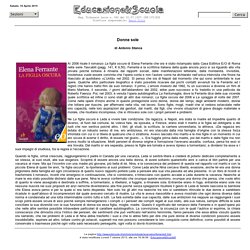
Elena Ferrante, Author of Naples Novels, Stays Mysterious - NYTimes.com. Photo ROME — The Italian writer Elena Ferrante’s gripping novels about the rich and complex lives of women — as mothers, daughters, wives, writers — have won her a devoted cult following.
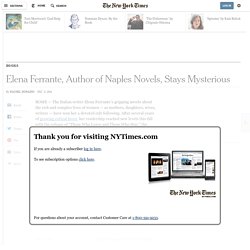
After several years of growing critical favor, her readership reached new levels this fall with the release of “Those Who Leave and Those Who Stay,” the third volume in her series of Naples novels, which recount the lifelong friendship of two women. In her most extensive interview in years, Ms. Ferrante, who publishes under a pseudonym and has never revealed her identity, addressed her choice of anonymity — or “absence,” as she called it.
In an interview conducted by email and through her publisher, she disputed the oft-circulated notion that she might be a man. As to rumors regularly recycled in the Italian press that she is the Italian novelist Domenico Starnone, Ms. Ms. The few things known about the author who signs her work Elena Ferrante come from what she has revealed in written interviews. Ms. Who Is Elena Ferrante? Elena Ferrante sono io - Laura Buffoni. “Nessuno è il mio nome”, com’era?
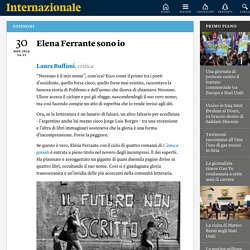
Ecco come il primo tra i poeti d’occidente, quello forse cieco, quello forse mai esistito, raccontava la famosa storia di Polifemo e dell’uomo che diceva di chiamarsi Nessuno. Ulisse acceca il ciclope e poi gli sfugge, nascondendogli il suo vero nome; ma così facendo compie un atto di superbia che lo rende inviso agli dèi. Ora, se la letteratura è un lunario di falsari, un altro falsario per eccellenza – l’argentino anche lui mezzo cieco Jorge Luis Borges – tra una recensione e l’altra di libri immaginari sosteneva che la gloria è una forma d’incomprensione. Forse la peggiore. Elena Ferrante's First In-Person Interview Sheds Light On Gender And Self-Doubt. Elena Ferrante on the Origins of her Neapolitan Novels. In a rare interview, Elena Ferrante reveals the personal origins of her Neapolitan novels.
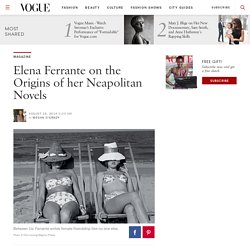
“Relationships between women don’t have solid rules like those between men,” says the Italian author Elena Ferrante. “I was interested in recounting how a long friendship between two women could endure and survive in spite of good and bad feelings, dependence and rebellion, mutual support and betrayal.” It would be difficult to find a deeper portrait of women’s friendship than the one in Ferrante’s Neapolitan novels, which unfold from the fifties to the twenty-first century to tell a single story with the possessive force of an origin myth.
Q. and A.: Elena Ferrante. The author who writes under the pseudonym Elena Ferrante responded to written questions via email through her longtime Italian publisher, Sandra Ozzola Ferri.
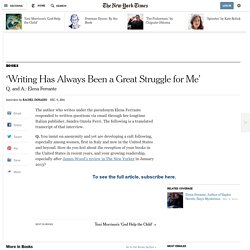
The following is a translated transcript of that interview. Who is the real Italian novelist writing as Elena Ferrante? Elena Greco knows what it is to be a writer with a public face.
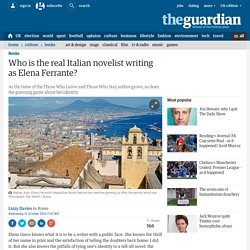
She knows the thrill of her name in print and the satisfaction of telling the doubters back home: I did it. But she also knows the pitfalls of tying one’s identity to a tell-all novel: the facile media, the unkind critics, and the cringing embarrassment of old friends trawling through the “dirty bits” with raised eyebrows and judgmental zeal. Greco, however, is a fictional character, the narrator of a three – soon to be four – novel series about the lives of two young women in postwar Italy. In stark contrast to her fictional heroine, the writer who created her shuns the limelight completely, to the extent that no one, except a handful of people close to her, knows who she is.
Over the past two decades Elena Ferrante – a pseudonym, of course – has become one of her country’s most exciting and compelling contemporary literary voices. Starnone is not the only one irritated by the persistent association of their names. Elena Ferrante: the global literary sensation nobody knows. Elena Ferrante is an Italian novelist who was born in or near Naples.
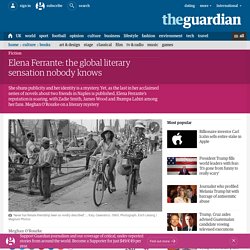
She seems once to have been married; she may have lived in Greece; she appears to be a mother. Or so we think. Elena Ferrante, l’écrivain(e) masqué(e) Pressenti(e) pour le prix Strega, l’auteur(e) de la saga « L’Amica geniale » dérange les lettres italiennes.
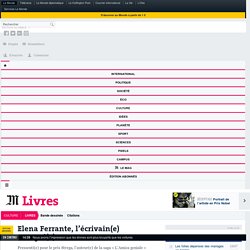
LE MONDE CULTURE ET IDEES | • Mis à jour le | Par Philippe Ridet (Rome, correspondant) Il fenomeno Elena Ferrante visto dai critici. Elena Ferrante ha accettato la candidatura allo Strega 2015 in una lettera al quotidiano La repubblica in cui, tra le altre cose, afferma che se non dovesse entrare in cinquina il premio andrebbe buttato per aria.
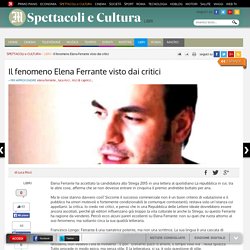
Knausgaard or Ferrante? - The New Yorker. In 1959, the literary critic George Steiner published a book called “Tolstoy or Dostoevsky.”
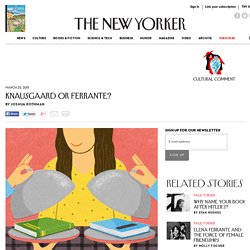
It didn’t ask which writer was better—they were “titans both,” Steiner wrote. Instead, it asked what a person’s preference for one over the other might mean. Discover which of the Russians a reader prefers and why, Steiner argued, and, “you will, I think, have penetrated into his own nature,” because an affinity for Tolstoy or Dostoevsky “commits the imagination to one or the other of two radically opposed interpretations of man’s fate, of the historical future, and of the mystery of God.” The titanic novelists of the current literary moment are Elena Ferrante and Karl Ove Knausgaard, and the temptation to compare them is just as irresistible.
Like Tolstoy and Dostoevsky, Knausgaard and Ferrante are equal geniuses whose books embody opposed values. Rivalry depends on similarity, and the first fact to acknowledge is that Knausgaard and Ferrante are strikingly similar.
Why I love Elena Ferrante: ‘A savage honesty that is both unsettling and comforting’ There is a savage honesty to the work of Elena Ferrante that is both unsettling and comforting at once. Here is an author who has poured every ounce of herself onto the page. None of us are privy to the writing habits of the reclusive Naples writer but upon reading her work, it feels like it must come in a torrent. A violent reaction to the page with no thought or idea not stretched to its absolute limit.